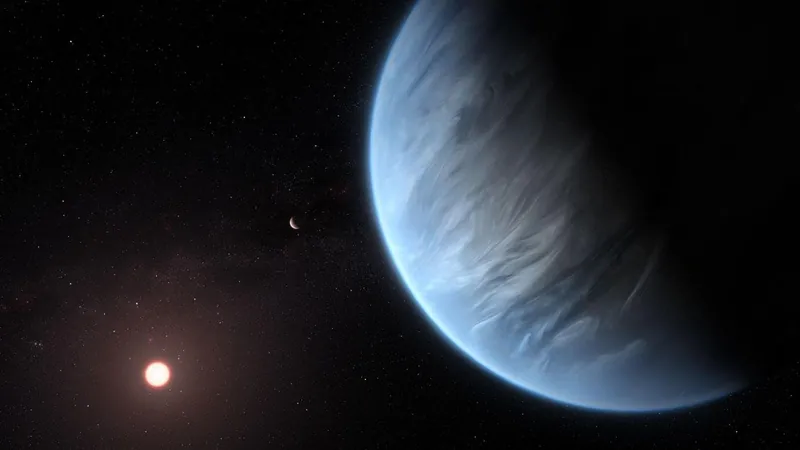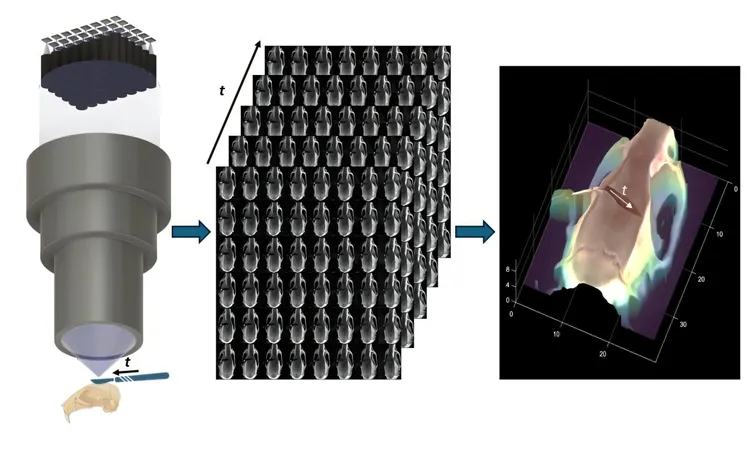
New Doubts Cast on Potential Signs of Life in Deep Space
2025-05-23
Author: William
A Controversial Discovery Under Scrutiny
In an announcement that captured global attention back in April, a team of scientists claimed to have detected a molecule in the atmosphere of a distant planet that could point to the existence of extraterrestrial life. The planet in question is K2-18b, located 124 light-years from Earth.
However, recent findings from researchers at the University of Chicago are raising significant doubts. They reanalyzed the data gathered from the James Webb Space Telescope and concluded that the evidence for this potential life-signaling molecule is far from conclusive.
The Molecules in Question
The original study suggested that either dimethyl sulfide or dimethyl disulfide—molecules linked to life on Earth—were present in K2-18b's atmosphere. Yet, the UChicago team argues that the data is too noisy for a solid claim. Rafael Luque, a postdoctoral researcher leading the analysis, stated, "There’s just not enough certainty to say one way or the other."
A Complex Puzzle of Data Interpretation
Interpreting data from such distant planets is a daunting task. To gather atmospheric information, the Webb Telescope observes starlight filtered through a planet's atmosphere as it transits in front of its star. Different molecules absorb varying wavelengths of light, creating unique signatures.
However, these signatures can overlap. As study co-author Michael Zhang explains, many compounds can produce similar readings, making it virtually impossible to pinpoint a specific molecule without more concrete evidence.
A Cautious Approach to Exciting Claims
The researchers emphasize a cautious approach in interpreting these findings. Instead of jumping to sensational conclusions about rare molecules, they advocate for considering more common explanations. For instance, ethane—a molecule detected in many planetary atmospheres, including Neptune—could also fit the observed signatures.
Co-author Caroline Piaulet-Ghorayeb stressed the importance of ruling out familiar molecules before proposing exotic ones when analyzing data.
A Call for Further Research
It's also important to note that the April claim was based solely on a single set of observations. The UChicago team's analysis, which incorporates additional data from multiple telescope observations, indicates that the signs of dimethyl sulfide are considerably weaker than originally proposed.
"Answering whether there is life outside the solar system is the most important question of our field," Luque remarked. "We are making enormous progress, and we don’t want that overshadowed by premature declarations."
As research continues, the search for life beyond our solar system remains both thrilling and complex, driven by cautious skepticism and rigorous scientific inquiry.









 Brasil (PT)
Brasil (PT)
 Canada (EN)
Canada (EN)
 Chile (ES)
Chile (ES)
 Česko (CS)
Česko (CS)
 대한민국 (KO)
대한민국 (KO)
 España (ES)
España (ES)
 France (FR)
France (FR)
 Hong Kong (EN)
Hong Kong (EN)
 Italia (IT)
Italia (IT)
 日本 (JA)
日本 (JA)
 Magyarország (HU)
Magyarország (HU)
 Norge (NO)
Norge (NO)
 Polska (PL)
Polska (PL)
 Schweiz (DE)
Schweiz (DE)
 Singapore (EN)
Singapore (EN)
 Sverige (SV)
Sverige (SV)
 Suomi (FI)
Suomi (FI)
 Türkiye (TR)
Türkiye (TR)
 الإمارات العربية المتحدة (AR)
الإمارات العربية المتحدة (AR)